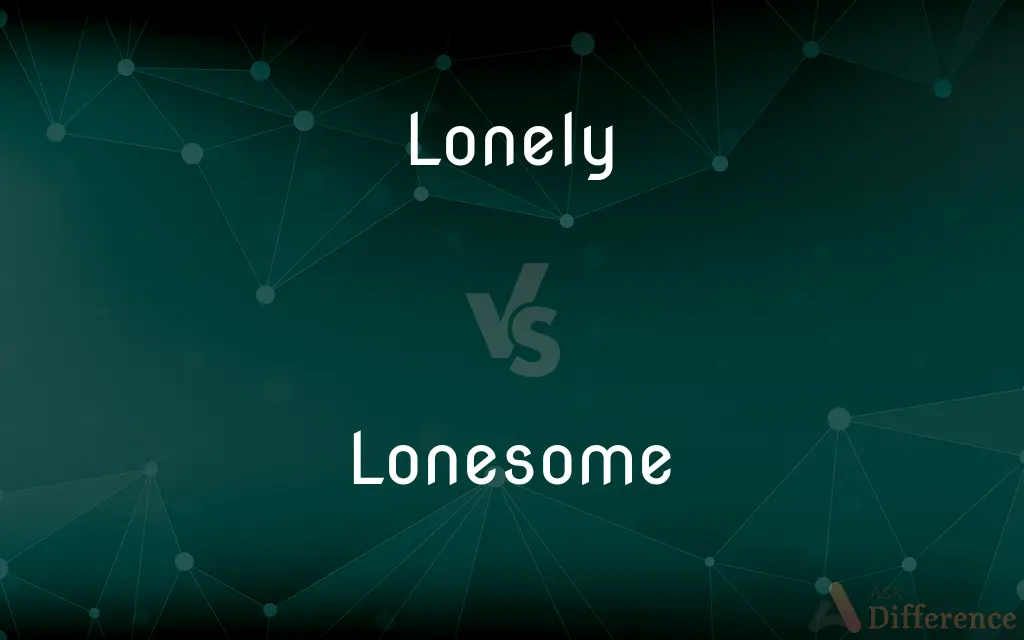Lonely vs. Lonesome — What's the Difference?
By Fiza Rafique & Urooj Arif — Updated on March 11, 2024
Lonely conveys feeling alone and isolated, often with sadness, while lonesome emphasizes the state of being solitary, sometimes by choice, with a poetic or less negative connotation.

Difference Between Lonely and Lonesome
Table of Contents
ADVERTISEMENT
Key Differences
Lonely describes a feeling of sadness or discomfort due to lack of company or isolation. It often reflects an emotional state where one feels disconnected from others, highlighting the negative aspect of being alone. On the other hand, lonesome can also refer to being alone but carries a nuanced difference. It often has a less negative or more reflective quality, sometimes suggesting a solitary experience by choice or a poetic solitude.
While loneliness is primarily associated with a negative emotional state, emphasizing the pain of being alone, lonesome can evoke a broader spectrum of feelings. Lonesome might be used to express melancholy or contemplation, suggesting a self-imposed solitude that allows for introspection or connection with nature. Whereas, lonely typically implies an unwanted separation from others, highlighting an unfulfilled desire for social interaction or companionship.
In literature and music, the term "lonesome" is often employed to evoke a sense of poetic solitude or a melancholic atmosphere. It's used to describe settings, moods, or characters that embody solitude with a depth of feeling or introspection. Lonely, however, is more directly associated with feelings of isolation and sadness, used to convey characters' or narrators' emotional states without the same romantic or introspective connotations.
The choice between using lonely and lonesome can significantly affect the tone and implication of a sentence. Saying "I feel lonely" directly expresses a sense of sadness and isolation. In contrast, saying "I feel lonesome" might suggest a more complex emotional state that includes elements of solitude, reflection, or a poignant sense of being alone.
Understanding the subtle differences between lonely and lonesome enriches language use, allowing for more precise expression of solitude and emotional states. While both terms relate to the experience of being alone, the choice between them can convey a wide range of emotional tones, from deep sadness to reflective solitude.
ADVERTISEMENT
Comparison Chart
Emotional Tone
Negative, sadness due to isolation.
Can be reflective, less negative, sometimes neutral.
Choice
Often implies unwanted solitude.
Can imply solitude by choice or circumstance.
Usage in Language
Used to express feelings of isolation and sadness.
Used more poetically or to evoke a specific mood.
Contexts
Social, emotional states.
Emotional, artistic, sometimes nature-related.
Connotations
Disconnection, desire for company.
Solitude, introspection, sometimes melancholy.
Compare with Definitions
Lonely
Feeling sad because of no company.
She felt lonely in the crowded room.
Lonesome
Embracing solitude.
His lonesome habits helped him discover himself.
Lonely
Emotionally separated.
Despite the laughter, he felt lonely at heart.
Lonesome
Sometimes chosen isolation.
She chose a lonesome path for meditation.
Lonely
Isolated from others.
The lonely island had no inhabitants.
Lonesome
Solitary but not always sad.
He enjoyed his lonesome walks in the park.
Lonely
Lacking companionship.
The long journey made him feel lonely.
Lonesome
Associated with melancholy beauty.
The lonesome call of the owl echoed at night.
Lonely
Desiring social interaction.
Lonely evenings made her miss her family more.
Lonesome
Reflecting on solitude.
The lonesome landscape inspired her poetry.
Lonely
Sad because one has no friends or company
Lonely old people whose families do not care for them
Lonesome
Lonesome is a 1928 American comedy drama part-talkie film directed by Paul Fejös, and starring Barbara Kent and Glenn Tryon. Its plot follows two working-class residents of New York City over a 24-hour-period, during which they have a chance meeting at Coney Island during the Independence Day weekend and swiftly fall in love with one another.
Lonely
(of a place) unfrequented and remote
A lonely country lane
Lonesome
Dejected because of a lack of companionship.
Lonely
Dejected by the awareness of being alone.
Lonesome
Producing such dejection
A lonesome hour at the bar.
Lonely
Producing such dejection
The loneliest night of the week.
Lonesome
Deserted; unfrequented
A lonesome valley.
Lonely
Without others of a similar kind; lone; solitary
"a lonely band of lawyers up against the might of the American legal establishment" (Nick Kotz).
Lonesome
Solitary; lone
A lonesome pine.
Lonely
Unfrequented by people; desolate
A lonely crossroads.
Lonesome
Self
He ate the meal all by his lonesome.
Lonely
Unhappy because of feeling isolated from contact with other people.
Lonesome
Unhappy due to being alone; lonely.
Lonely
Unfrequented by people; desolate.
Lonesome
(informal) Oneself alone.
I sat and watched the cars pass all by my lonesome.
Lonely
Without companions; solitary.
Lonesome
Secluded from society; not frequented by human beings; solitary.
Like one that on a lonesome roadDoth walk in fear and dread.
Lonely
Sequestered from company or neighbors; solitary; retired; as, a lonely situation; a lonely cell.
Lonesome
Conscious of, and somewhat depressed by, solitude; as, to feel lonesome.
Lonely
Alone, or in want of company; forsaken.
To the misled and lonely traveler.
Lonesome
Being the only one; single and isolated from others;
The lone doctor in the entire county
A lonesome pine
An only child
The sole heir
The sole example
A solitary instance of cowardice
A solitary speck in the sky
Lonely
Not frequented by human beings; as, a lonely wood.
Lonesome
Marked by dejection from being alone;
Felt sad and lonely
The loneliest night of the week
Lonesome when her husband is away
Spent a lonesome hour in the bar
Lonely
Having a feeling of depression or sadness resulting from the consciousness of being alone; lonesome.
I am very often alone. I don't mean I am lonely.
Lonely
Lacking companions or companionship;
He was alone when we met him
She is alone much of the time
The lone skier on the mountain
A lonely fisherman stood on a tuft of gravel
A lonely soul
A solitary traveler
Lonely
Marked by dejection from being alone;
Felt sad and lonely
The loneliest night of the week
Lonesome when her husband is away
Spent a lonesome hour in the bar
Lonely
Separated from or unfrequented by others; remote or secluded;
A lonely crossroads
A solitary retreat
A trail leading to an unfrequented lake
Lonely
Enjoyed or performed alone;
A lonely existence
His lonely room
Took a solitary walk
Enjoyed her solitary dinner
Solitary pursuits such as reading
Common Curiosities
Can someone be lonely in a crowd?
Yes, feeling lonely can occur even in the presence of others, highlighting an emotional state rather than just physical solitude.
Can lonesome be a positive feeling?
Yes, lonesome can carry a more neutral or even positive connotation, reflecting on solitude or self-imposed isolation for reflection or peace.
How do lonely and lonesome differ in usage?
Lonely often describes a negative emotional state due to isolation, whereas lonesome can describe a state of being alone with various emotional tones, including a reflective or poetic solitude.
Does lonesome always imply sadness?
No, lonesome does not always imply sadness. It can also reflect a contemplative or peaceful state of being alone.
Can animals feel lonely or lonesome?
Animals can exhibit behaviors indicative of loneliness or seeking companionship, though interpreting these as "lonesome" involves anthropomorphizing.
Is being lonesome the same as being alone?
Being lonesome involves being alone but also includes the emotional or poetic reflections on solitude, which may not always be negative.
How can one cope with loneliness?
Coping with loneliness can involve seeking social connections, engaging in activities that bring joy, and seeking professional help if needed.
Why might someone prefer to be lonesome?
Some might prefer to be lonesome for introspection, creativity, or enjoying solitude away from social pressures.
Can loneliness affect one’s health?
Yes, prolonged loneliness can negatively affect mental and physical health, leading to conditions like depression and heart disease.
What role does social media play in loneliness?
Social media can exacerbate feelings of loneliness by highlighting perceived social isolation or lack of meaningful connections.
What does it mean to feel lonely?
Feeling lonely implies a sense of sadness or emptiness due to a lack of connection or companionship with others.
Is lonesome used in literature differently than lonely?
In literature, lonesome is often used to evoke a specific mood or atmosphere, sometimes with poetic or reflective connotations, whereas lonely directly expresses characters’ emotional states of isolation and sadness.
Are there health benefits to being lonesome?
Moderate periods of solitude, or being lonesome, can offer benefits like increased creativity, self-reflection, and mental rest.
How do cultures view loneliness and lonesomeness differently?
Cultural perspectives on loneliness and lonesomeness vary, with some cultures valuing solitude and reflection more positively than others.
How do children express feelings of loneliness?
Children may express loneliness through changes in behavior, withdrawal, sadness, or verbalizing their feelings of isolation.
Share Your Discovery

Previous Comparison
Biscuit vs. Wafer
Next Comparison
Shorts vs. TrousersAuthor Spotlight
Written by
Fiza RafiqueFiza Rafique is a skilled content writer at AskDifference.com, where she meticulously refines and enhances written pieces. Drawing from her vast editorial expertise, Fiza ensures clarity, accuracy, and precision in every article. Passionate about language, she continually seeks to elevate the quality of content for readers worldwide.
Co-written by
Urooj ArifUrooj is a skilled content writer at Ask Difference, known for her exceptional ability to simplify complex topics into engaging and informative content. With a passion for research and a flair for clear, concise writing, she consistently delivers articles that resonate with our diverse audience.














































